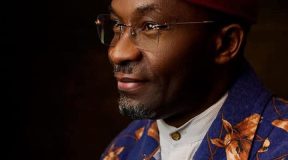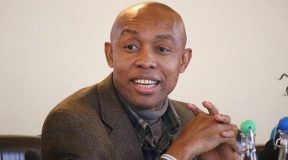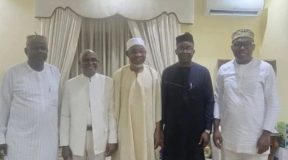MRS. NELLA ANDEM-RABANNE, a Former Attorney General of Cross River State and Principal Partner Lexglobal Partners yesterday said; One of the greatest challenges Nigeria faces, as a country is a constant threat to her national unity, integration and corporate existence.
Notwithstanding the various laudable programs, initiatives such as the establishment of the National Youth Service Corps (NYSC) scheme, the Unity Schools, Federal Character Principle, creation of states which all promote unity and national integration, appears to her, that the desired corporate sentiment of oneness which these programs seek to achieve; remain a fleeting illusion’.

She made this disclosure yesterday at the prestigious Royal Society of Arts House, London, United Kingdom in a three-day event organized by COMMONWEALTH
BUSINESS WOMEN TRADE MISSION UK in conjunction with Diplomatic Vista Nigeria.

The event entitled, ‘DEVELOPING STRONGER SYNERGY AMONGST COMMONWEALTH BUSINESS WOMEN IN LEADERSHIP; was to bring together policymakers from Nigeria and the UK, as well as business leaders, captains of industries and other stakeholders from Nigeria and members of Diaspora in the UK to source for projects financials and Agribusiness/Agro-Trade between Nigeria and United Kingdom for local needs and export. Also to source for financial institutes, donor agencies and businessmen and women who will like to invest in Nigeria.

MRS. NELLA ANDEM-RABANNE who was a guest speaker at the three-day event entitled her presentation IS FISCAL FEDERALISM THE WAY OUT FOR NIGERIA’S
UNITY AND INTEGRATION? She made some shocking revelation in a conceptual clarification of Federalism, which she said is traceable to British Colonial rule, while she described Federalism as the appropriate governmental principle designed to accommodate a country’s multi-ethnic, cultural, religious, linguistic diversities whilst mustering a sense of national unity.

Her words: Our founding fathers negotiated and obtained our independence based on agreed terms, which guaranteed a federal system of governance and fiscal autonomy united under a central government with each region existing independently of each other. The reality is that the Nigerian federalism as it is currently structured does not adequately promote national unity and integration as evidenced by continuous protestations and agitations hampering any feelings of common identity and common sense of patriotism and nationalism.
Until Fiscal Federalism is viewed as a philosophy of development, the argument is mute. This is because; Fiscal Federalism is about public finance and development. It is a mechanism by which the Federal Government can retain the support of the people by changing unfair and unjust policies that disenfranchise parts of the polity. It also entails the ability of the federal government to drive infrastructural, technological development and upgrade of high-tech industries for wealth creation.
MRS. NELLA ANDEM-RABANNE emphasised on restructuring which in her opinion is not limited to devolution of political-administrative powers, but primarily fiscal devolution by increasing or decreasing fiscal autonomy of the federating States.
According to her; the concept of diversification of our economy is restructuring, that is why I find it strange that some consider the call for restructuring to be an attempt to disintegrate the nation.
Rather, it should be the reserve. Nigerian federalism has undergone structural changes from its initial three-region structure at independence, North, East, West to a four-region structure, North, East, West, Mid-West in 1964.
Nigeria was restructured to 12 states in 1967 and now it is currently 36 states, federal capital territory Abuja and 774 (seven hundred and seventy-four) local governments.
Let me acknowledge that these changes were made in response to the agitation of the minority regions for a system of government, which would give them a sense of belonging and foster national unity. Yet the agitation still rages, WHY?
Although it is said that state and local government creation has enabled more widespread development across the country, the clamour for more States creation to achieve relative equality of component units and regional balance which is still on-going. That is why the restructuring question will continue to be the underbelly for Nigeria, unless an equitable formula, which was identified and adopted by the founding founders is reverted to and implemented’.
MRS. NELLA ANDEM-RABANNE gave a brief historical perspective of devolution of fiscal federalism in Nigeria and how it has caused tension and violent conflicts against the socio-economic fabric of the country.
Her words; From independence in 1960 to 1970 the principle of derivation stood at 50% of the revenue accruing to the Federation Account directly from any natural resources. Decree No 113 of 1970 initiated by Chief Obafemi Awolowo and promulgated by General Yakubu Gowon’s administration reduced derivation to 45% but this was 45% of the revenue accruing to the Federation Account directly from any natural resources within the on-shore territory of the state.
Consequently, revenue accruable to the Federation Account from natural resources off-shore was appropriated to the Federal Government in its entity.
This was the beginning of the distortion of fiscal federalism in Nigeria where on-shore-off-shore dichotomy was dubiously introduced to deny the oil-producing States their entitlements. At that time, it was made out to be an emergency wartime effort by the Federal Government to prosecute the Nigeria civil war and thereafter reconstruct the country as a post-war effort.
In 1977, General Olusegun Obasanjo (Rtd.) as Head of State reduced the revenue derived from natural resources originally allocated to the oil-producing States, by a
further 20% in favour of the Federation Account. This thereby reduced the derivation to the oil-producing States to 25% of the revenue accruable from on-shore production.
In 1981, even the elected political regime reduced derivation by another 20% thereby reducing derivation to 5%. In 1984, a further 3.5% of derivation was removed leaving the oil-producing states with 1.5% derivation from onshore production.
It was General Ibrahim Babangida, who reduced the derivation to 1% but introduced the Oil Mineral Producing Areas Development Commission (OMPADEC) at 3% for the development of the oil-producing region. He also abolished the offshore – onshore dichotomy, which was a first step in the journey to social justice, equity and harmony’’.
In her view to the current degree of fiscal federalism across Nigeria, she said the three tiers of government are economically dysfunctional, inequitable and a threat to national unity and integration. Unless there is a genuine constitutional recalibration involving a systematic move to full economic and political devolution of powers, Nigeria as a corporate entity will not thrive.
She made mention of The National Conference of 2014, which to her is the closest to collective negotiation and buy-in for the restructuring of the nation into a fair equitable federation where national unity and integration would prosper.
Closing her presentation, Mrs NELLA ANDEM-RABANA said over 80% of Nigeria’s revenue is derived from oil exploration and exploitation located within the Niger-Delta and the resource is for the benefit of the entire nation. She believes without appropriate enthronement of a fiscal regime that ensures social, economic and environmental justice, there shall be no real peace and development.
Her words: ‘Unless equitable distribution of revenue from resources; strengthening of institutional pillars of integrity to reduce corruption, respect for the principles of separation of powers and decentralisation of government, unity and national integration would only be imagined but never attained.
The federal government should adopt and implement the recommendations made by the Devolution of Powers Committee during the 2014 National Conference as a start.
With a reasonable degree of efficiency and effectiveness, some measure of national unity, cohesion and stability would be enhanced. Although the Nigerian State continues to maintain that the unity of Nigeria is not negotiable, it is imperative that the State retains the support of its people through honest negotiation, mutual respect and a genuine desire to achieve justice, equity and good conscience.
Finally, I reiterate that the principles of Fiscal Federalism in Nigeria were based on the negotiated terms of our founding fathers at Independence. The Fiscal Federalism adopted and implemented at the time provided for the federating units (regions) to be entitled to 50% of revenues derived from resources within their spheres of control.
I recommend that in the interest of national unity and integration, we should revert to this formula or adopt the vertical allocation as recommended by the National Conference of 2014 whilst making the Fundamental Objectives and Directives Principles of State Policy (Chapter 2 of the 1999 Constitution (as amended)) justiciable’.
Earlier, Mrs Afoma Clara Adigwe, Chairperson/CEO of CommonWealth Business Women Nigeria said, she is happy to be part of the commission of creating a huge platform for businessmen and women both in UK and Nigeria to thrive. More also strengthening good governance in Nigeria so that investors can prosper.
Her Words: We saw a need of creating cohesion of promoting trade between Nigeria and the United Kingdom and we are on it sourcing for a financial institute, donor agencies and businessmen and women who will like to invest in Nigeria.
This will continue by revitalizing business leaders for peaceful coexistence and ceaseless opportunities in business.
The height of the event was the Award of Excellence given to several Business Executives in Nigeria and the UK. Among the awardees present at the events is Chief
(Mrs) Folashade Tinubu-Ojo, Emir of Kano, Muhammed Sanusi Lamido and his wife, (MRS) Sadiya Muhammadu Sanusi ll. They all gave a profound vote of thanks to
COMMONWEALTH BUSINESS WOMEN TRADE MISSION UK and NIGERIA for their tremendous work of bracing businessmen and women in Leadership both in Nigeria and the UK.
The three- days event in London, UK has several bigwigs and elites from Nigeria and UK and amongst them are, Mrs. Afoma Clara Adigwe, Chairperson/CEO of CommonWealth Business Women Nigeria, Chief (Mrs) Folashade Tinubu-Ojo, President General of Market Women and Men of Nigeria, Arif Zaman, Executive Director CBW, Fulani (MRS) Sadiya Muhammadu Sanusi ll, Giwar SAN Kano, Mr Sina Oduko, CEO of Sysdigit Communications UK/NIGERIA, Sanusi Lamido, Emir of Kano, Mr Joshua Israel, CEO, Diplomatic Vista UK/NIGERIA.
By Olakunle Agboola
For publication of your news content, articles, videos or any other news worthy materials, please send to nnekatorti@gmail.com. For more enquiry, please call +234-706-806-4347 or whatsapp +234-706-806-4347. To place an advert, please call 07068064347.





